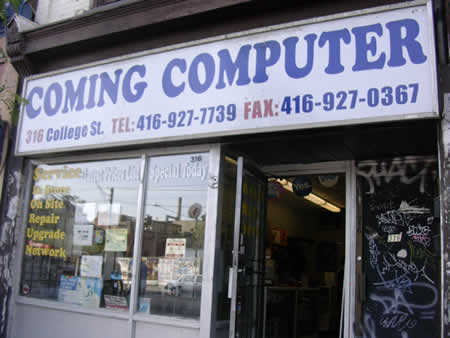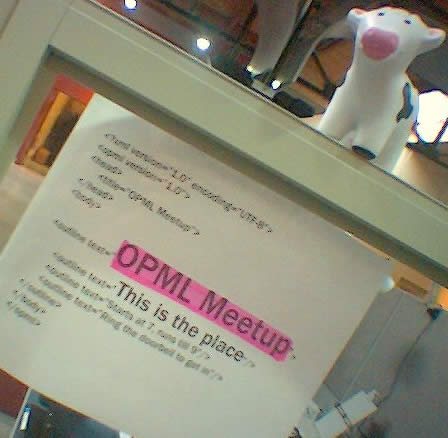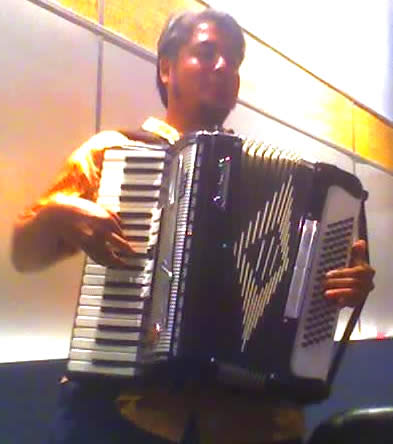
[Cross-posted to The Farm and Tucows Developer]
First, something that Tucows resellers will “get”:
The General Acceptance release of the new Client Code Suite (CCS) will
be
released tomorrow! You’ll be able to download the CCS package and find
accompanying documentation at the CCS site then, and the CCS site will
regularly feature articles covering different aspects of CCS, including
customizing it to fit your business and its needs.
Before I go on, I’d like to show my appreciation for the development
teams in the both the Toronto and Starkville offices. You folks have
worked hard, and the end result looks great. A filet mignon on a
flaming sword to you all!
CCS? What’s That? (Or: In case you’re not a Tucows reseller or in the internet services business)
Firstly, an explanation of what Tucows does.
We’re a company that sells
internet services wholesale to our customers — internet service
providers, web hosting companies and the like — who in turn resell
them to their customers. These services include domain names, digital certificates, Blogware, email, anti-spam services, site publishing, DNS and maybe cool new things like Skydasher.
It’s been said that internet service providers and hosting services are
in an industry like the construction and home improvement contractor
industry. Rather than being an industry in which there’s one big player
with 80% of the market, another with 10% of the market and the
remainder compteting over the last 10%, there are thousands of
contractors, each of whom serve their own small segment of the market.
In that industry, there’s no “Wal-Mart plumber” who fixes 80% of
everyone’s pipes, nor is there a “Microsoft drywaller” to whom 80% of
people go when they want to finish the basement.
Our customers are in similar situation — internet service providers
and hosting services also serve their slice of the pie. If they’re like
construction contractors, we’re Home Depot: we sell them the stuff they need to serve their customers. Following this metaphor further, my job is to be Bob Vila (or Tim Allen), helping their developers customize our services to their needs.
Next, how our customers resell our services
Most of our
customers sell our services by setting up a web site where their
customers can purchase services. The site then communicates with our
servers, which then provision the service. There are two approaches to
implementing such a site:
- You can directly access our OpenSRS API.
This involves writing
your own web site completely from scratch, including all the back-end
software that talks to our OpenSRS servers. You need a dedicated and
knowledgeable developer or team of developers to do this. The people
who take this approach tend to be large ISPs serving tens of thousands
of customers.
- You can use client code.
This is pre-written software that displays the web pages for your site
and communicates with our OpenSRS servers. You’ll have to make some
customizations — some are cosmetic, such as adding your company logo
and other corporate identity elements; others are related to which
Tucows services you’re reselling, and if you’re selling services in
bundles. The people who take this approach tend to be small to medium
companies, who make the bulk of our customers. Some of our most active
customers fall into this category and are companies of one or two
people operating out of their own homes. (Gotta love the internet!)
Our current client code offering
Right now, our customers can get their hands on something called the
Reseller Client Library (RCL). There are some problems with it:
- It’s a royal pain to install.
I like to consider myself a reasonably savvy developer/techie type, and
I feel like drop-kicking my machine across the room every time I
install it.
- After you install it, you’ve got to customize it.
The RCL doesn’t give you a ready-to-face-the-world web site right “out
of the box”. It’s a skeleton on which you add your own code and
customizations in order to have a functioning web site for selling
services. This means you’ve got to know how to program in Perl and how
to fit your code in with ours.
- The installation pain is nothing compared to the upgrading pain.
When we release a new version of the RCL — typically when we make some
fizes, changes to an existing service or when we introduce a new
service — you’ve got to apply your customizations again.
- Integrating a payment gateway isn’t easy.
If you haven’t got some way to get money from your customers in
exchange for the service you’re reselling, you’re in trouble. You can
hook the RCL up to a payment gateway, but you’ve got to do it in
several places in the code. Miss one of those places, and there’s a
“hole” by which your customers could be getting those services for free.
- It’s a bit troublesome to run under Windows Server.
RCL is written in Perl, which has always been a little troublesome for
web apps hosted on Windows-based servers. You have to do some extra
work in order to get RCL to run under Windows.
Enter CCS
CCS is a vast improvement over the RCL. Where the RCL is a foundation
with which you can build a site to resell our services, CCS is a
turnkey solution — it’s a fully-functional web service storefront than
runs once you’ve installed it and run the setup wizards. If you’re
feeling lazy, you can keep your customizations to a minimum and simply
stick your company logo on it.
(If you’re really lazy, you can simply change your company name to “Your Logo Here”.)
CCS has these features:
- Easy to install and configure.
The most basic setup steps are: Download. Unzip. Run the technical
setup wizard. Run the business setup wizard. Change logo. Sell services.
- Easy to customize and upgrade.
It has a nice user interface that lets you set the prices without
having to edit configuration files. Its template system lets you change
the look and feel to match your company’s identity and keep those
changes even when we update the client code.
- Simple payment gateway integration.
Payment gateway integration with a number of gateways or via our billing service, Platypus, is much, much easier.
- It’s easy to create and sell bundles.
When used in tandem with Platypus, you can create bundles of services
— collections of services sold as a single unit. For example, it’s
easy to create a bundle containing a domain name, a Blogware blog,
email with three addresses and some web hosting space and then sell it
as a single package. You can create any number of bundles.
- It runs on Unix and Windows servers.
It’s written in PHP 5, which has good cross-platform support. I’ve seen
it run on Linux, Windows and even MacOS (some of our developers use
Macs as development boxes).
Coming tomorrow!
The release date for the 1.0 version of CCS is Thursday, August 4th. It will be available for download from the CCS site,
where you’ll find lots of extra information, hints and tips. If you’re
thinking of becoming a Tucows reseller — and especially if you already
are one and use the RCL — I think you’ll really like what CCS has to
offer.






